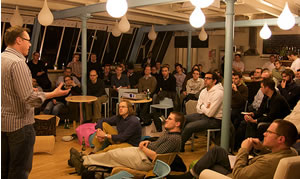 With the next #geomob event coming along tomorrow (30th June, deets below), we thought you’d like to know what it’s like and why you’d be doing yourself a favour for going along.
With the next #geomob event coming along tomorrow (30th June, deets below), we thought you’d like to know what it’s like and why you’d be doing yourself a favour for going along.
#geomob is a fresh London social meetup that, you won’t be surprised to hear, centres on services that use geo-locating data and those apps that run on mobile devices.
It’s run by Christopher Osborne an all over good guy and geo man around town.
Friendly
We popped over to its second meeting and were rather impressed.
The top floor of wallacespace in London, where it was then held, is a great venue – relaxed, well equipped with a staffed kitchen that served hot snacks and a fridge full of beer (thanks to Yahoo’s Geo group for funding it).
The assortment of relaxed seating quickly filled to a group of double the size of #geomob’s first meeting, made up of friendly tech bods.
Interesting speakers
There were four presenters are the event we went to, but they change each session.
Google’s Russell Middleton ran through the recent changes to their geo/map offerings, including auto location detection, working on static and mobile device.
The most potentially useful advance was Google’s static maps. They’re near instantly displayed as they’re flat JPGs, as opposed to the previous standard of needing to load map tiles and Javascipt.
Andrew Scott overviewed Rummble, a mobile recommendation service.
Alfie Dennon‘s talk was a smorgasbord of projects built around the idea of constructive change through technology.
An example being StoppedClocks enabling member of the public to report when and where they see stopped clocks around the UK.
Once they are identified, a deal was done with a clock repairing company to carry out the repair work at cost.
The goodness doesn’t stop there. A college, that runs a clock repair course, has its students go out and practice their studies fixing the clocks – everyone gains.
One of the additional great things about this project is its achievement in encouraging / extracting input from people – people who would normally be really unlikely to enter information into a Web service.
Once these people have had their popped their online cherries, the likelihood is that they’ll be far more willing to contribute.
_FluidDB
The last presenter, Terry Jones *covered* the radically open and flexible FluidDB.
In essence, it’s a database that doesn’t have a rigid structure, because life and the information that comes at you during it aren’t structured.
When data is stored, those with a knowledge of databases will be surprised to hear that Objects don’t have owners. Objects have Attributes. Attributes have Owners.
We were pretty surprised that the assemblage of geeks weren’t all already aware of Terry’s FluidDB.
Given the exciting nature of the database, and I suspect, the sheer energy of Terry’s approach, he was ‘allowed’ to carry on beyond the normal 10 minutes presenters are allotted.
_Is #Geomob good?
Not only is the area of geo-location finally coming in to bloom, but event-founder Christopher Osborne and his compatriots have fashioned #geomob into a great, relaxed environment to swap geo and tech talk and experiences at.
Get your skates on though – there’s not many tickets left.
Highly recommended.
#geomob June
British Computer Society
5 Southampton St
London, WC2E 7HA
6-10pm
image: Roman Kirillov